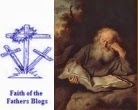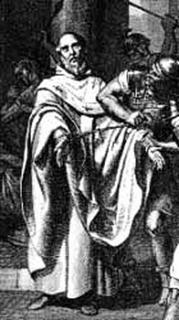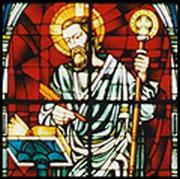Bishop,
Martyr, and Early Church Father
Saint
Theophilus of Antioch, is one of the Greek Fathers of the Church, and
one of whom was a great apologist, an apologist in truth, as great as
Justin Martyr or Irenaeus of Lyons in his understanding and
reasoning. Born a pagan in the second century, he was originally a
philosopher in the eastern Roman Empire, and he began studying the
Scriptures with the intent of attacking Christianity. However, his
study of the Scriptures demonstrated the absurdity of the pagan gods,
and convinced him of the truth of Christianity, and so, he converted.
Little
is known of the early life of Theophilus, other than that he came
from that part of Syria which bordered upon Mesopotamia. Theophilus
received a Greek education and seems to have had some knowledge of
Hebrew. Eusebius in his History of the Church (Ch.4,20), wrote that
Theophilus was the sixth bishop of Antioch from the apostles, the
names of his predecessors being Eros, Cornelius, Hero, Ignatius, and
Euodius. We also learn from Eusebius, that Theophilus succeeded to
the bishopric in the 8th year of the reign of the emperor
Marcus Aurelius, which would have been about 168 A.D. There is some
disagreement as to when Theophilus died, some sources saying his
episcopate lasted 13 years until 181 A.D, others indicating his
episcopate lasted 21 years until his death in 189 A.D.
Saint
Theophilus was apparently a prolific writer, and Eusebius, Saint
Jerome, and others mention his numerous works against the prevailing
heresies of the day. The only work which survives, is his three
volume “Apology” or “Defense of Christianity” to his friend
Autolycus, a pagan. In this three volume work, Theophilus has the
distinction of his being the earliest writing to
contain the Greek term “triados” (Book 2, Chapter 15) which is
the equivalent of the English word Trinity. It would be 1 or 2
decades later before we find in the North African
writer Tertullian's writings, the Latin equivalent "Trinitas"
for the first time. Eusebius mentions other writings of his, a work
against the heresy of Hermogenes, another against Marcion, and a few
books for the instruction and edification of the faithful. St. Jerome
mentions a Commentary on the Book of Proverbs and Commentaries on the
Gospel. Of all these works, there remain but the fragments of the
Commentaries cited by St. Jerome.
Some
believe that Theophilus' Apology was written in response to a
published work against Christianity written by Autolycus, but,
Theophilus himself indicates in his work, that what he writes is in
response to disparaging remarks Autolycus made to him in
conversation. Indeed, at the very beginning of his Apology,
Theophilus wrote:
A
fluent tongue and an elegant style afford pleasure and such praise as
vainglory delights in, to wretched men who have been corrupted in
mind; the lover of truth does not give heed to ornamented speeches,
but examines the real matter of the speech, what it is, and what kind
it is. Since, then, my friend, you have assailed me with empty words,
boasting of your gods of wood and stone, hammered and cast, carved
and graven, which neither see nor hear, for they are idols, and the
works of men's hands; and since, besides, you call me a Christian, as
if this were a damning name to bear, I, for my part, avow that I am a
Christian, and bear this name beloved of God, hoping to be
serviceable to God. For it is not the case, as you suppose, that the
name of God is hard to bear; but possibly you entertain this opinion
of God, because you are yourself yet unserviceable to Him.
(Book 1, Chapter 1)
Theophilus
is severe, yet also gentle is his dealings with his antagonistic
friend, and his contempt with the pagan heathenism is apparent, and
he even repudiates Plato and Socrates, and stressed his maxim, "The
world by wisdom knew not God." The entire work is well suited to
lead an intelligent pagan to at least a cordial acceptance of
Christianity. The three books are not however, as one might suppose,
one work, but, were three distinct works which were joined together.
This was done because there is a very real connection between the
three books, in that all three are addressed to the same person,
Autolycus, and all three deal with almost the same topics.
The
first book has 14 chapters, and is a response to Autolycus who had
asked Theophilus to show him his God, had praised the pagan gods, and
had mocked the name Christian. Theophilus explains the nature of God
who is invisible to the eyes, but, who's presence is known to us:
You
will say, then, to me, "Do you, who see God, explain to me the
appearance of God." Hear, O man. The appearance of God is
ineffable and indescribable, and cannot be seen by eyes of flesh. For
in glory He is incomprehensible, in greatness unfathomable, in height
inconceivable, in power incomparable, in wisdom unrivaled, in
goodness inimitable, in kindness unutterable. For if I say He is
Light, I name but His own work; if I call Him Word, I name but His
sovereignty; if I call Him Mind, I speak but of His wisdom; if I say
He is Spirit, I speak of His breath; if I call Him Wisdom, I speak of
His offspring; if I call Him Strength, I speak of His sway; if I call
Him Power, I am mentioning His activity; if Providence, I but mention
His goodness; if I call Him Kingdom, I but mention His glory; if I
call Him Lord, I mention His being judge; if I call Him Judge, I
speak of Him as being just; if I call Him Father, I speak of all
things as being from Him; if I call Him Fire, I but mention His
anger. You will say, then, to me, "Is God angry?" Yes; He
is angry with those who act wickedly, but He is good, and kind, and
merciful, to those who love and fear Him; for He is a chastener of
the godly, and father of the righteous; but he is a judge and
punisher of the impious. (Book 1, Chapter 3)
Theophilus
goes on to explain in the first book, that we can only contemplate
God when we are clothed in incorruptibility. He then denounces the
pagan gods, the worship of the emperors and extols the Christians:
Wherefore
I will rather honor the king [than your gods], not, indeed,
worshiping him, but praying for him. But God, the living and true
God, I worship, knowing that the king is made by Him. You will say,
then, to me, "Why do you not worship the king?" Because he
is not made to be worshiped, but to be reverenced with lawful honor,
for he is not a god, but a man appointed by God, not to be worshiped,
but to judge justly. For in a kind of way his government is committed
to him by God: as He will not have those called kings whom He has
appointed under Himself; for "king" is his title, and it is
not lawful for another to use it; so neither is it lawful for any to
be worshiped but God only. Wherefore, O man, you are wholly in error.
Accordingly, honor the king, be subject to him, and pray for him with
loyal mind; for if you do this, you do the will of God. For the law
that is of God, says, "My son, fear thou the Lord and the king,
and be not disobedient to them; for suddenly they shall take
vengeance on their enemies."
And
about your laughing at me and calling me "Christian," you
know not what you are saying. First, because that which is anointed
is sweet and serviceable, and far from contemptible. For what ship
can be serviceable and seaworthy, unless it be first caulked
[anointed]? Or what castle or house is beautiful and serviceable when
it has not been anointed? And what man, when he enters into this life
or into the gymnasium, is not anointed with oil? And what work has
either ornament or beauty unless it be anointed and burnished? Then
the air and all that is under heaven is in a certain sort anointed by
light and spirit; and are you unwilling to be anointed with the oil
of God? Wherefore we are called Christians on this account, because
we are anointed with the oil of God. (Book 1, Chapters 11 and
12)
The
second book of Theophilus' Apology to Autolycus contains 38 chapters,
and more fully develops the thoughts and ideas expressed in the first
book. Theophilus exposes the insufficiency and childishness of the
pagan teachings, and contrasts those teachings with those of Holy
Scripture concerning the origin of the world, the worship due to God,
and the moral life man should lead:
When
we had formerly some conversation, my very good friend Autolycus, and
when you inquired who was my God, and for a little paid attention to
my discourse, I made some explanations to you concerning my religion;
and then having bid one another adieu, we went with much mutual
friendliness each to his own house although at first you had home
somewhat hard upon me. For you know and remember that you supposed
our doctrine was foolishness. As you then afterwards urged me to do,
I am desirous, though not educated to the art of speaking, of more
accurately demonstrating, by means of this tractate, the vain labour
and empty worship in which you are held; and I wish also, from a few
of your own histories which you read, and perhaps do not yet quite
understand, to make the truth plain to you. (Book 2, Chapter
1)
The
third book in Theophilus' Apology to Autolycus, contains 30 chapters,
and is a response to Autolycus' charge that “your religion is new,
and your Scriptures are recent writings." The first 15 chapters
Theophilus devoted to showing the futility of the accusations brought
against Christians concerning immorality and cannibalism, and in the
remainder he takes up the chronological discussion and gives a resume
of Jewish history, and concludes that Moses must have lived from 900
to 1000 years before the Trojan War. He counts 5695 years from the
beginning of the world to the death of Marcus Aurelius. He begins:
Theophilus
to Autolycus, greeting: Seeing that writers are fond of composing a
multitude of books for vainglory,--some concerning gods, and wars,
and chronology, and some, too, concerning useless legends, and other
such labour in vain, in which you also have been used to employ
yourself until now, and do not grudge to endure that toil; but though
you conversed with me, are still of opinion that the word of truth is
an idle tale, and suppose that our writings are recent and
modern;--on this account I also will not grudge the labour of
compendiously setting forth to you, God helping me, the antiquity of
our books, reminding you of it in few words, that you may not grudge
the labour of reading it, but may recognise the folly of the other
authors. (Book 3, Chapter 1)
Theophilus
was a most patient man, who took a great deal of time and care in his
defense of the true faith. He had an intimate knowledge of Holy
Scripture, and was very apt at demonstrating the truth of God and His
Church as compared to the absurdities and childishness of the pagan
gods and their followers. The Apology
to Autolycus can be read in it's entirety online.
From
Saint Jerome's “Lives of Illustrious Men”:
Theophilus
the bishop
Theophilus,
sixth bishop of the church of Antioch, in the reign of the emperor
Marcus Antoninus Verus composed a book Against Marcion, which is
still extant, also three volumes To Autolycus and one Against the
heresy of Hermogenes and other short and elegant treatises, well
fitted for the edification of the church. I have read, under his
name, commentaries On the Gospel and On the proverbs of Solomon which
do not appear to me to correspond in style and language with the
elegance and expressiveness of the above works.
Copyright
© 2006 Steve Smith. All Rights Reserved.











